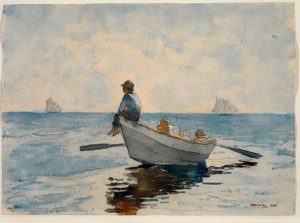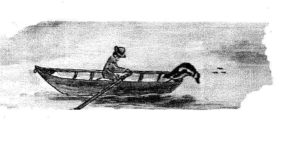 I was born surrounded by waters.
I was born surrounded by waters.
The city of Corral in Southern Chile is perched on a hillside in front of the Bay of Corral and faces due west and north. Due west is the Pacific Ocean with New Zealand, the nearest land in that direction and 5400 miles away. Due north, the city of Niebla (meaning fog and well named), is 1.5 miles across the bay. There is either salt water or fresh water all around. With the Río Chaihuin to the south and the Rios Valdivia and Tornagaleones to the east, the best way to get to Corral even today, is by boat. As early as forty years ago, it was the only way.
My father was a medical man, and after medical school, he was hired by the foundry in Corral to provide minimal care to its workers, help the matrona or midwife, and make a stab at replacing the witch doctor, or curandero, although herbalist would be a kinder name.
Picture a man on a horse with a black poncho over him, a black bag across the saddle, and an ill-mannered horse slipping and sliding under him on a steep and muddy hillside during a monsoon, and one begins to get an idea of what the job was like. In those days, doctors made house calls, or shack calls, and looking back, risked their hides doing so. Corral, I might point out, has an average of 200 rainy days per year with an annual precipitation of 80″ to 100″, although, if one is to believe the old timers, it is nothing like before: fifty years ago, it would start to pour in late March and not stop until mid-November.
I was born in Corral, assisted by a one-eyed midwife wearing sunglasses so my grandmother would not faint, and one who according to legend shooed my father away because he made her nervous. Somewhere there is a small black and white picture with serrated edges of a two year-old me playing in the old Spanish fort below the house. The fort, now a tourist attraction, existed in utter disrepair for centuries, and has only recently regained some of its former dignity.
I grew up as a free range kid, especially in the river. Surprising now, but at the time we were left to wander by ourselves, as most kids five and older were, and we took full advantage. With my brother to man the other oar of the heavy wooden boats at our disposal, we would set out to reconnoiter all the creeks, big gullies, and small islands, rowing up and down the river from sunup to sundown, with no more than a loaf of bread and a chunk of cheese to sustains us. At the end of the day, we usually needed to be rescued by some adult that remembered us, and seeing daylight diminishing went out looking for us. Our goal at the time was to be so good that God would let us be pirates when we grew up.
mt


